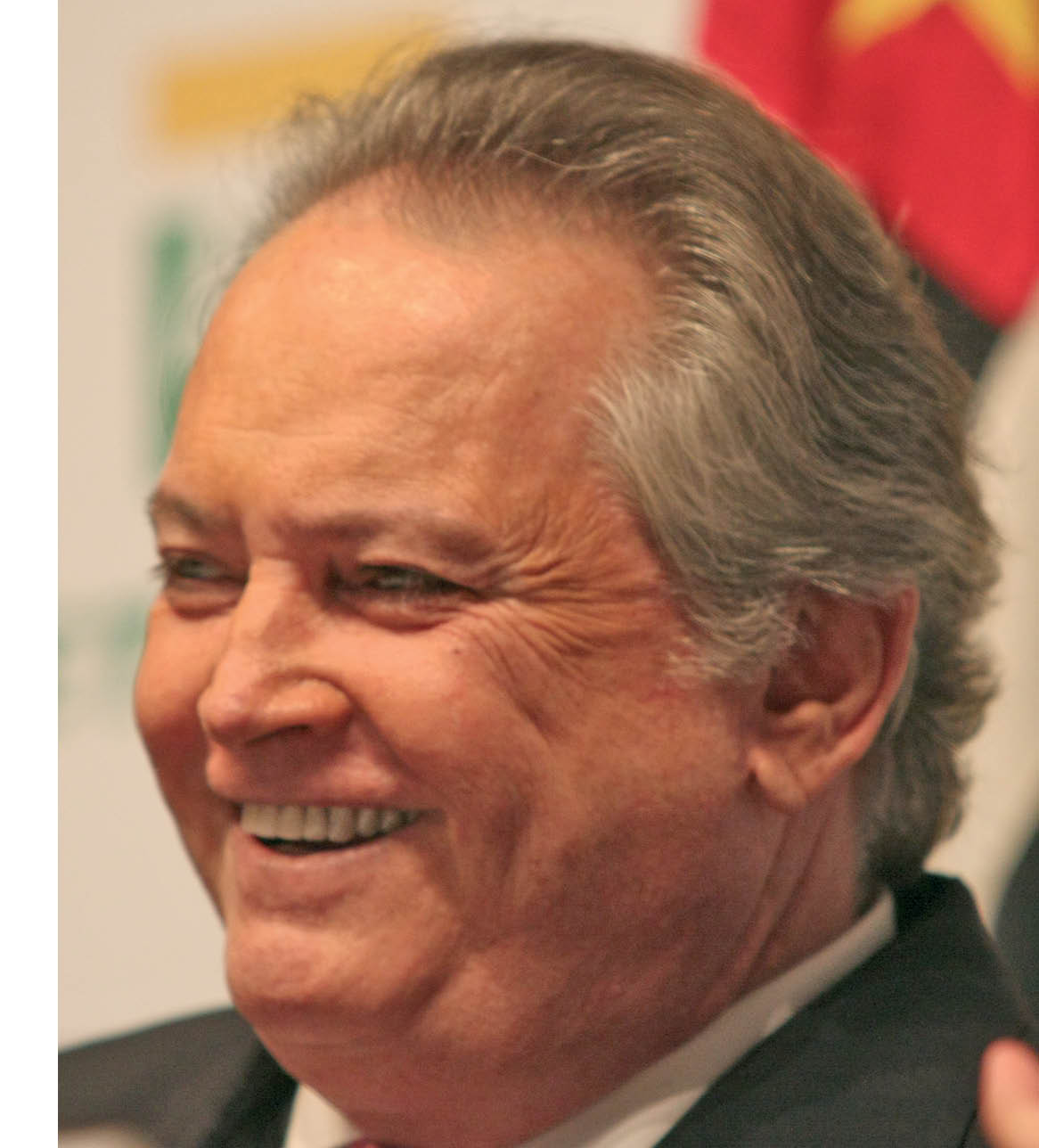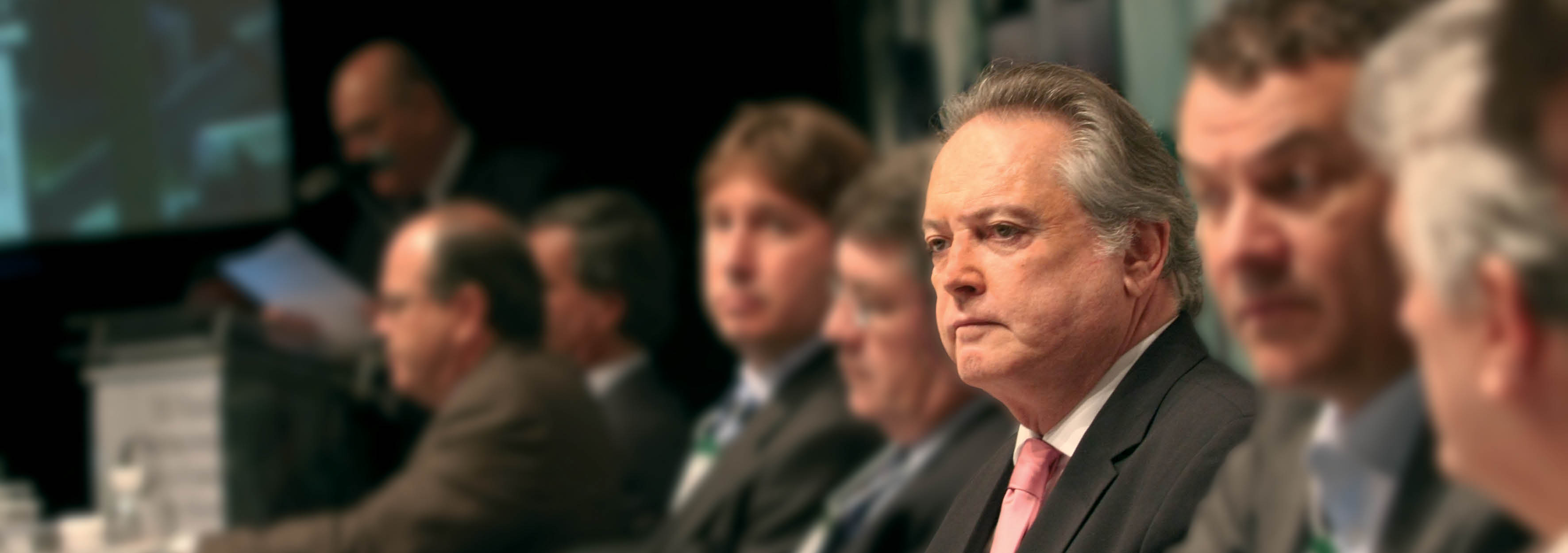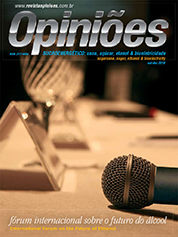Wagner Gonçalves Rossi
Minister of Agriculture
Op-AA-26
We are truly a success story
I think the sugar and ethanol industry may be viewed as an example and symbol of Brazilian leadership in the world economy and as a mark along this extraordinary path of relevant changes in the profile of the Brazilian economy. This is specifically so because it is a complex production chain that advances in the direction of the future, while opening new perspectives and new ways to perform. Brazilian ethanol has become a world reference.
Few countries in the world achieve such significant change in their energy matrix, which includes clean, renewable energy, essentially produced from national resources. Nowadays, Brazil offers this knowledge to less developed nations in Africa and the Orient. It is important to notice that all these advancements achieved by the sugar and ethanol industry were unimaginable 50 years ago, even only 20 or 10 years ago.
I was with President Lula a few days ago talking about coming here. We all know that of the segments the president got involved in, this one was the object of his special attention and enthusiasm, in a very personal manner, as evidenced by actual initiatives, such as the incentives for dual-fuel (“flex-fuel”) vehicles – a unique program in the world.
As related to the quest for internationalization, the president stood out as the man who looked for markets, using every opportunity he had to publicize the Brazilian ethanol program, while defending its sustainability. He instructed us in the Ministry of Agriculture to realize the agricultural/environmental zoning, brought about the signing of a social protocol with the mills, practically took part in all international fora that were in any way meaningful, such as here at the Fenasucro and Agrocana.
One of the issues pending solution is taxation, but with respect to the CIDE fuel tax, the president differentiated the tax on ethanol in comparison with the tax on gasoline. He also supported the use of bagasse as a generator of electric power and throughout his term in office, provided intensive support through the government’s financial bodies.
On occasion, ethanol consumption in Brazil actually surpassed that of gasoline. We reached a production of more than 660 million tons of sugarcane, adding 680,000 hectares of plantations, which still is less than 1% of the national territory used for sugarcane plantations. In fact, this totals slightly more than 8 million hectares, which is a very small fraction.
I wonder how the myth arose that sugarcane was invading grain producing areas, if we, this year, achieved the all-time record in grain production in Brazil, with 147 million tons. May sugarcane, grain and cattle breeding activities grow so that one may close the gap between agriculture and cattle breeding in terms of technological development.
 We must move forward on this issue. More importantly, we produced 28 and a half billion liters of ethanol, of which almost 8 and a half were anhydrous and just over 20 billion were hydrated ethanol, while we produced 38 million tons of sugar that again boosted the industry thanks to the appropriate marketing of the product in the international market.
We must move forward on this issue. More importantly, we produced 28 and a half billion liters of ethanol, of which almost 8 and a half were anhydrous and just over 20 billion were hydrated ethanol, while we produced 38 million tons of sugar that again boosted the industry thanks to the appropriate marketing of the product in the international market.
I wish to emphasize, since this is an international forum, that all this was achieved by this industry thanks to its venturous entrepreneurs in agriculture and industry. This was accomplished in a country that has 55% of its territory intact with the vegetation cover provided by Nature when the explorers first set foot on this land. No other country in the world measures up to this.
Ours is the largest agriculture, we have the largest sustainably exploited extraction area in the world. A total of 6,200,000 hectares of forests exploited while respecting the environment – one extracts what the forest has to offer, without destroying it. Nowadays, we have specific programs for environmental protection, such as the Boi Guardião (Guardian Ox), in which all the large slaughtering companies and now even the medium and small companies refuse to market meat originated in recently deforested regions.
We also should mention the agreement celebrated between oil extracting soybean crushing companies and authorities in the industry, along with NGOs, by which no soya originating in recently deforested areas may be marketed in Brazil. People need to know that we have the most productive agriculture in the world.
Lack of information, ignorance or bad faith require productivity indexes of Brazilian producers, when, in fact, it is the Brazilian producer that achieves the highest productivity indexes. In the past 20 years, we experienced growth of only 25% in Brazil’s cultivated area and 152% growth in production.
We are singled out as destroyers of Nature, when, in fact, no one is capable of helping Nature to stay balanced as much as the rural producers are, because it is they who care for the land, prevent erosion and the mudding of water bodies, and that protect their water springs, while seeing to it that everything works well on their land.
At this forum we are welcoming representatives of many countries that are interested in our ethanol program. It is advisable that they be informed of the fact that they are coming to the agriculture that nowadays has the highest technological growth rates, the highest rates of science incorporation into the production process, while also sustaining the highest preservation indexes in the productive world.
We are the agriculture that produces, that feeds the world. We export food to 215 countries, we are super-efficient and self-sufficient throughout the entire Brazilian production chain – with the exception only of wheat, of which we only produce 50% of our consumption. We are the number one exporter of sugar, bovine meat and poultry meat. We dispute the number one ranking in soya with the United States, whose production is larger than ours, while we have a larger export capacity.
We are an important player in coffee, orange juice, corn, pork, and many other products. Apart from the sugar and ethanol industry’s significant economic and social contribution to the country and the benefits provided the people involved, we all refer to the city of Sertãozinho as a mark in terms of development.
This is where the companies are that make equipment to produce ethanol and some large companies developed here based on the expertise contributed by our people. People have no idea that we are the third organic agriculture in the world. We have an area of 1,770,000 hectares in which no chemicals, fertilizers or pesticides are used in the production process. We can say that we are leaders in agriculture, because our development has a very important vector.
We are a country with a strong agriculture – for all the qualities we were capable of developing, along with the lesson on how to preserve the environment. This is highly gratifying. There is still much prejudice. Many people still have no knowledge about the reality of Brazil and talk about our country from the perspective of their own interests.
I recently returned from the European Union, where I went to negotiate, under the circumstances, issues relating to the meat industry, with the highest ranking authorities in Europe – European commissioners and committee chairpersons in the European parliament –, and all of them, behind closed doors, told me: “we know, but the campaign against Brazil was so intense that what needs to be done is eliminate what remained, what was left over in the imagination of ordinary Europeans concerning the limitations that were made up against Brazil, which never actually existed, but became reality at a global level due to the lack of information”.
Europe has always been our main trade partner. Nowadays, in some sectors, we lost this predominance, but Brazil, on account of its extraordinary production competency, is capable of setting up new partnerships, such as, for example, nowadays, with Russia and Iran, that in the meat area have replaced Europe. We lost nothing in our meat exports, so what we must do is provide information. We need not accept that the lack of knowledge generates a kind of prejudice against the country that built all this up while living in a solid democracy.





